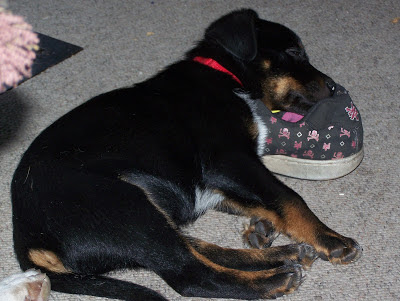Every new dog that we bring into the house has help Rubi expand her communication skills, and Wash is no exception. Rubi loves puppies - Rubi loves everyone - but her usual play style of "body slam them until they make noise" is really not suited to a dog that weighs less than a fifth of what she does. As a result, when Wash first came home, I watched him and Rubi like a hawk. Their play time was extremely limited, and I brought out my clicker to help pin down for Rubi exactly how she should be playing with the puppy.
 |
| Wash, world's cutest Notweiler. |
I used my clicker to mark and reward appropriate play behaviors. When she chose to interact in a way that wasn't, say, pounding him with her ass or trying to fit his whole body in her mouth, she got a click and a cookie. I was particularly careful to mark calming and negotiation signals. Body language such as lip licks, look aways, mirroring the puppy's body language, and yawning, among other signals, cue dogs that they really are just playing, and that everything is okay. Rewarding her this way helped her to stop what she was doing and take a few seconds break, something that is very natural in canine play. It also helped reduce the amount of time that Rubi had to get aroused and excited over Wash.
After many many many many short sessions, Rubi's play became much more gentle. She was laying down with Wash to play, instead of trying to stand over him, and she seemed to pick up on his body language much more effectively. I was able to be pickier in what I rewarded, choosing to click only the best play behaviors. Eventually, when it seemed that Wash and Rubi were finally speaking the same language, I weaned off the treats entirely, praising Rubi for appropriate behavior and checking in with me. I still keep play sessions relatively short, but I no longer have to stand over the dogs to make sure Rubi doesn't accidentally flatten Wash, or to make certain that Wash doesn't push too many of Rubi's buttons as puppies are wont to do.
While I had a hunch that Rubi was capable of playing appropriately with a smaller dog, not every dog is a candidate for this type of canine communications training. Maus, for instance, would rather fall over dead than be forced to do something as undignified as play with a puppy. To say it another way, not every dog is dog park material. This is a hard concept for many people, and it is always hard for a trainer to have that conversation with a client where they try to explain to the client that the fantasy dog that they have imagined is simply not the dog that is at the end of their leash.
I don't expect Rubi to get along with all dogs any more than I expect myself to get along with all humans. On the other hand, I don't think it's unreasonable to be able to sit in the same room as someone you hate and be able to keep your damn mouth shut. If I can do it, so can Rubi.
A couple of weeks ago, we packed Wash off for a stay with Andy the Arm Candy while we dog sat
MJ, another one of ARLP's program dogs, while her regular foster parents were on vacation. I was pretty sure that Rubi and MJ were not going to get along what with both being strong-mind, adult women, and sure enough, MJ wasted no time in letting me know that she wanted nothing to do with my dogs. As I said earlier, that's fine; I know that my house is busy and can be particularly stressful for new dogs (MJ is typically dog tolerant to social, by the way), and nobody has to like everybody.
However, I do expect everyone to keep a civil tongue in their heads.
 |
| MJ, owner of the World's Cutest Underbite. |
I worked MJ and my horde of dogs with basic counter conditioning and desensitization. Baby gates are life savers at my house, so when I wasn't actively working with the dogs, I would cover the baby gates with a sheet so the dogs couldn't interact. For short periods, no longer than five minutes several times a day, I would uncover the baby gates and feed dogs cookies for looking at each other. When this was no longer exciting, I gave out cookies for looking away from other dogs. By the end of the week, MJ and the horde were able to have "free time" around uncovered gates for up to twenty minutes. I still watched carefully, though, and if they sniffed each other through the gate, I made sure that I was there to reward and redirect before things got, ah, interesting.
Given enough time, I think I could have integrated MJ into the herd fairly well, but there's a difference between not swearing at each other, and living together in peace. There are definitely dogs out there that will never be comfortable living with other dogs. This is okay, too. It's up to us as their humans to provide appropriate social contact for our dogs. For some dogs, this means living with other dogs; for others, it means regular, structured play dates. And for some dogs, it means never being asked to exist closely with other dogs. Dogs, like people, are social creatures, but each dog and person is a unique individual with different needs, desires, and capabilities when it comes to coexisting with others.









